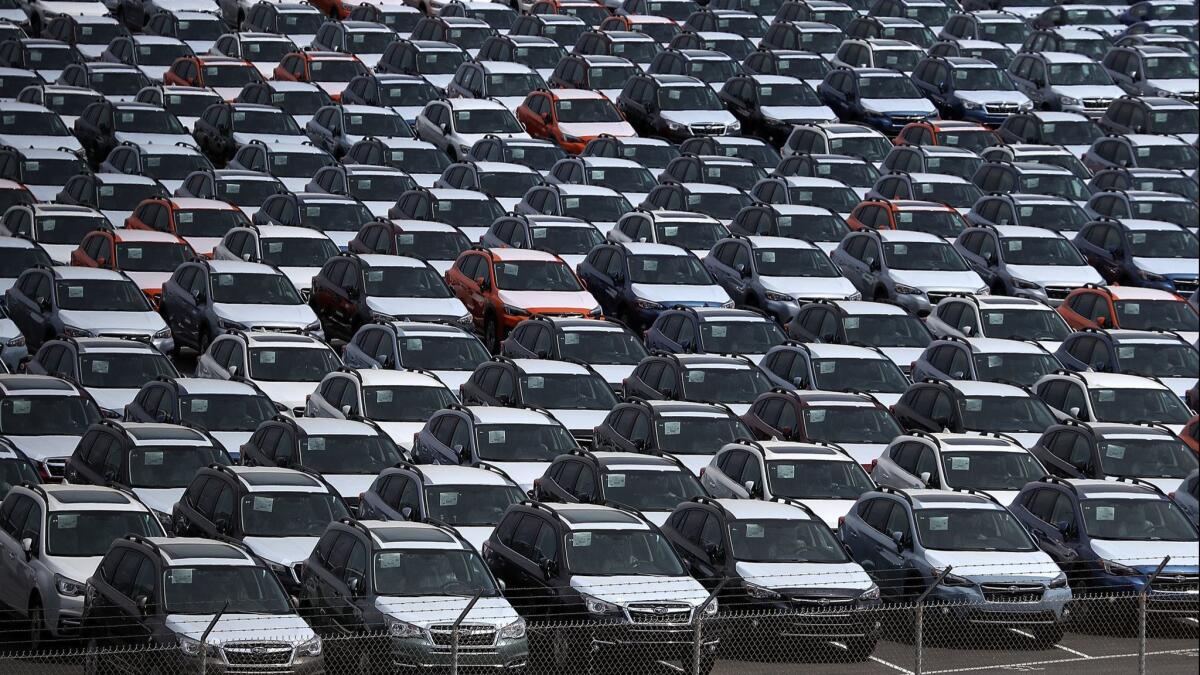Editorial: Trump’s tariff obsession threatens the auto industry

Just as everything looks like a nail to a man with only a hammer, every trade issue seems to cry out to President Trump for import tariffs. Scarcely a week goes by without an announcement from the Commerce Department about some new levy being considered or placed on an imported product. The latest potential target: foreign-built cars and trucks, which make up more than 40% of the U.S. market.
The president ordered Commerce Secretary Wilbur Ross on Wednesday to consider the effect of car, truck and parts imports on national security, citing the same protectionist U.S. law Trump and Ross used to authorize tariffs of 10% to 25% on aluminum and steel imports. It will likely be weeks before Ross comes back with a recommendation, but the mere prospect of more tariffs on top of those on the steel and aluminum has the automobile industry running around with its collective hair on fire.
The timing is, shall we say, inopportune for carmakers. U.S. vehicle sales are cyclical, and they started sliding last year after seven years of growth. A stiff tariff on imports would only accelerate that trend. Tariffs, after all, are effectively a tax on consumers because they raise the price of goods — either directly, by making imports more expensive, or indirectly, by prodding consumers to buy a pricier domestic model.
The administration’s brutalistic thinking on trade is that it’s a zero-sum game: more products made in foreign factories mean fewer made here, with fewer jobs for Americans. And when consumers here buy more imported goods than domestically produced ones, other countries are #winning — not because of some legitimate advantage their manufacturers might enjoy, but because the scales are tilted. In the White House’s view, slapping tariffs on imports, or even just threatening to do so, helps persuade our trading partners to address the imbalance.
The administration’s brutalistic thinking on trade is that it’s a zero-sum game.
The real picture is far more complex, particularly in the auto industry. Cars assembled here include many foreign-made parts, just as cars assembled outside the U.S. may contain multiple parts made here. To put that in industry-speak, supply chains are global. Meanwhile, foreign car companies have been setting up a growing number of plants in the United States, just as U.S. manufacturers are putting factories around the world. They do that mainly to push production closer to where cars are sold, but also to cut labor costs. For a U.S. company, that means hiring workers in Mexico; for a German manufacturer, that means hiring them in South Carolina.
So cars built in the U.S. by any company, foreign or domestic, would be unlikely to escape a tariff on imports, given that it would raise the cost of all the imported parts they use. And cars assembled outside the U.S. would see their prices jump regardless of how many U.S. jobs were involved in creating their design, their technology and their parts. Remember, U.S. automakers import cars too — General Motors, for example, used foreign factories to assemble a quarter of the cars it sold in the U.S. last year.
If the rest of the world does nothing, stiff new U.S. tariffs could conceivably prod automakers to shift jobs to the United States, which is Trump’s stated goal. But as we’re seeing with Trump’s solar panel, steel and aluminum levies, any move to impose tariffs is all but certain to prompt retaliation from our trading partners. The rest of the world has lowered barriers to U.S. autos and other goods over the years in response to U.S. negotiations; major exporters like Japan, Germany and even China have plenty of room to ratchet their tariffs back up.
That’s the big potential downside of tariffs, both for the United States and for the global system of trade rules the U.S. has spent decades promoting. But Trump, who argues that the system isn’t working for Americans, probably sees his latest tariff threat as more leverage in the many other fights he’s waging with our trading partners, including those with Mexico and Canada over the North American Free Trade Agreement, with Germany over its contributions to NATO and with China over, well, everything.
The U.S. auto industry was slammed by the last recession, shedding nearly 40% of the jobs in vehicle and parts manufacturing from 2007-09 as car sales plummeted. Sales and jobs have since recovered all that lost ground, but the bigger picture for autoworkers is more sobering: Even today, jobs remain almost 30% below their peak in 2000. That’s a consequence of automation, not just global competition. Tariffs wouldn’t change that reality; instead, by eating into sales and prompting global retaliation, they would land like a hammer to the head.
Follow the Opinion section on Twitter @latimesopinionand Facebook
More to Read
A cure for the common opinion
Get thought-provoking perspectives with our weekly newsletter.
You may occasionally receive promotional content from the Los Angeles Times.






